
Romanian postcard by Casa Filmului Acin.

Romanian postcard by Colectia Cinefilului Acin.

Romanian postcard by Casa Filmului Acin, no. 491. Photo: Barbra Streisand and Robert Redford in The Way We Were (Sydney Pollack, 1973).
You'll Never Know
Barbara Joan Streisand was born in the Williamsburg district of Brooklyn, New York, in 1942. Her parents, Emanuel Streisand and Dinah Rosen, were of Jewish descent. Streisand's maternal grandparents came from the Russian Empire and her paternal grandparents were from Polish Galicia. They had emigrated to the US at the turn of the century.
Streisand's parents both worked in education and met at the school where they both worked. Streisand has an older brother, Sheldon Streisand. In August 1943, a few months after her first birthday, Streisand's father died suddenly. Her mother now had to provide income on her own with a low-paid job as an accountant.
When Barbra Streisand was seven years old, her mother married Louis Kind. From this marriage came Streisand's half-sister Roslyn Kind, who also became an actress, singer and songwriter.
Streisand's mother had a beautiful voice and together they made a few tape recordings on which they sang as a duo. This was the first time she thought of a career as a singer. Streisand attended Erasmus Hall High School in Flatbush with Neil Diamond, with whom she later sang the duet 'You Don't Bring Me Flowers', and with future world chess champion Bobby Fischer.
In 1955, 13-year-old Barbra Streisand recorded two songs for a demo tape. One of the recordings was 'You'll Never Know'. Already as a teenager, Streisand performed as a nightclub singer. Because she actually wanted to become an actress, she appeared in the musical 'Driftwood' and several other Summer stock productions. She gained her first stage experience as early as 1958 when she appeared in three plays at the Clinton Theatre.

East-German postcard by VEB Progress Film-Vertrieb, Berlin, no. 186/70. Photo: Steve Schapiro / Columbia. Barbra Streisand in Funny Girl (William Wyler, 1968).
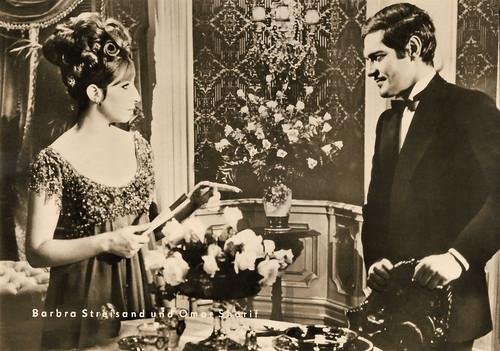
East-German postcard by VEB Progress Film-Vertrieb, Berlin, no. 209/70. Photo: Columbia. Barbra Streisand and Omar Sharif in Funny Girl (William Wyler, 1968).

Dutch postcard. Sent by mail in 1969.

Romanian postcard by Casa Filmului Acin, no. 554, no. 7. John Wayne and Barbra Streisand during the Oscars ceremony 1970. Streisand presented the Best Actor award to Wayne on the 42nd Academy Awards show. Wayne won the Oscar for his performance in True Grit (Henry Hathaway, 1969).
Funny Girl
In 1961 Barbra Streisand made her first television appearance on The Tonight Show. She signed her first recording contract with Columbia Records in 1962. Her debut album, 'Barbra Streisand Album', won two Grammys in 1963. More television guest appearances followed, such as on The Judy Garland Show in 1963, where she sang 'Happy Days Are Here Again' and Judy Garland's 'Get Happy'. Both songs were arranged by Garland into a duet.
She released her second album, 'The Second Barbra Streisand Album', in the autumn of 1963. From 1961 she also got engagements on Broadway. Her first role was in the musical 'I Can Get It For You Wholesale', by Harold Rome, receiving a Tony Award nomination for Best Supporting Actress and a New York Drama Critics Poll award.
Another smash Broadway hit followed in 1964 as legendary Broadway star Fanny Brice in the musical 'Funny Girl' by Jule Styne and Bob Merrill. Streisand's first no 1 song was 'People', the main song of 'Funny Girl', which reached the top-hit position in 1964. She signed an exclusive contract with CBS for a series of annual TV specials. My Name Is Barbra (1965), which won an Emmy, and Color Me Barbra (1966) were extremely successful.
In the cinema, she had her breakthrough with the leading role in the film adaptation Funny Girl (William Wylker, 1968). Streisand received an Oscar for her role as Fanny Brice at the Academy Awards in 1968. After a series of screen musicals, such as Gene Kelly's Hello, Dolly! (1969) and Vincente Minnelli's On a Clear Day You Can See Forever (1970), she wanted to try comedies, resulting in such films as The Owl and the Pussycat (Herbert Ross, 1970). She celebrated another significant success alongside Ryan O'Neal in the leading female role in the Screwball Comedy What's Up, Doc? (Peter Bogdanovich, 1972).
In 1972 she also founded the production company Barwoods Films, with which she produced her own films. She turned to dramas and turned out Up the Sandbox (Irvin Kershner, 1972) and the classic The Way We Were (Sydney Pollack, 1973), co-starring Robert Redford. The song 'The Way We Were' became one of her biggest hits and most memorable and famous songs. She debuted as a director with the musical drama Yentl (Barbra Streisand, 1983), in which she also portrayed a Jewish girl who is forced to pass herself off as a man to pursue her dreams. For Yentl, she served as producer, director, screenwriter and lead actress. The preoccupation with Judaism, the theme of Yentl, runs like a thread through Streisand's works. Later, she produced such films as Prince of Tides (Barbra Streisand, 1986), Nuts (Martin Ritt, 1987), and The Mirror Has Two Faces (Barbra Streisand, 1996) with great success.
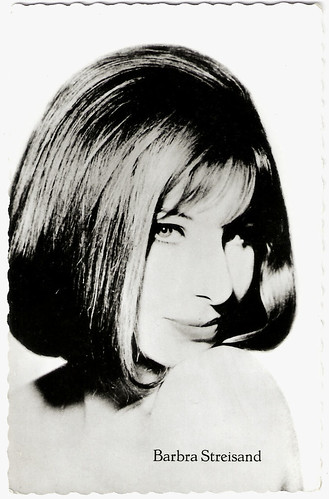
Dutch postcard. Photo: CBS Grammofoonplaten.

French postcard in the Entr'acte series by Éditions Asphodèle, Mâcon, no. 005/13. Collection: B. Courtel / D.R. Louis Armstrong, Barbra Streisand, and Gene Kelly on the set of Hello Dolly! (Gene Kelly, 1969). Caption: A moment of pause for Gene Kelly and his stars Barbra Streisand and Louis Armstrong.
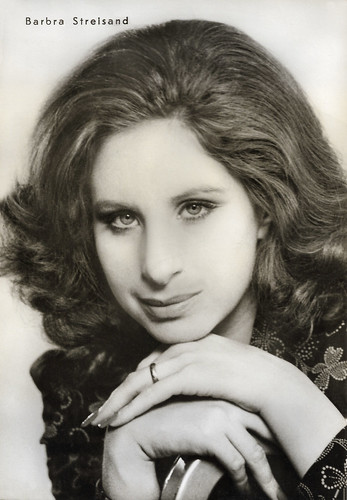
East-German postcard by VEB Progress Film-Vertrieb, Berlin, no. 121/75. Barbra Streisand in The Way We Were (Sydney Pollack, 1973).

East German postcard by Progress Film-Verleih, Berlin, no. 108/76. Barbra Streisand in For Pete's Sake (Peter Yates, 1977).
Woman in Love
After gaining fame in the 1960s with artistic and highly successful songs from Broadway musicals and interpretations in the realm of traditional pop and jazz standards, Barbra Streisand first moved in a contemporary musical direction influenced by soft rock and mass and youth culture in 1969 with the album 'What About Today?' In the 1970s and early 1980s, Streisand was one of the most important pop singers with her distinctive, always somewhat dramatic-sounding vocal style, with a repertoire of numerous ballads, some from film soundtracks.
She received a second Oscar in 1977 for her composition 'Evergreen' for the film A Star Is Born (Frank Pierson, 1976) with Kris Kristofferson. She was the first woman to be awarded this prize. In 1976, Streisand made a classical album, 'Classical Barbra', that included music by Robert Schumann. From the album 'Lazy Afternoon' (1975) onwards, she also repeatedly recorded songs in the disco style popular at the time. This culminated in the number one hit 'No More Tears (Enough Is Enough)' (1979), a duet with the then "Queen of Disco", Donna Summer.
In 1980, she scored another major no. 1 hit with 'Woman in Love'. The song was taken from her 1980 album 'Guilty', on which she collaborates with Barry Gibb. It was not until 1985 that she returned to her musical roots with 'The Broadway Album' when she recorded some of his most beautiful musical songs under the direction of Stephen Sondheim. The album was a best seller and earned her another Grammy Award for Best Female Pop Vocal Performance in 1987.
In 2005, they collaborated again on the follow-up, 'Guilty Pleasures'. She scored another international hit in 1997 with 'Tell Him', a duet with Céline Dion. In total, Streisand has released more than 60 albums, including 12 film soundtrack albums. She is the female artist with the most gold, platinum and multi-platinum albums.
She made two more films - a supporting role as a sex therapist mother in the Ben Stiller comedy Meet the Fockers (Jay Roach, 2004) and its sequel, Little Fockers (Paul Weitz, 2010), alongside Dustin Hoffman and Robert De Niro. After a long break from filming, she returned to a starring role in The Guilt Trip (Anne Fletcher, 2012), a mother/son picture co-starring Seth Rogen. She published a book, 'Passion for Design', in 2010. Streisand was married to Elliott Gould between 1963 and 1971. They had a son, Jason Gould (1966), who played Streisand's son in the film Prince of Tides (Barbra Streisand, 1991). In 1998, she married James Brolin.
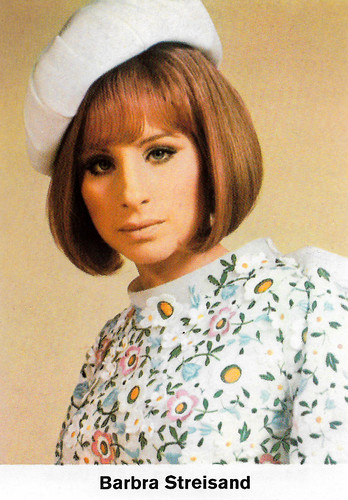
German collectors card in the Show-Top-Stars series by Bergmann Verlag, Unna. The complete series counted 270 star cards.
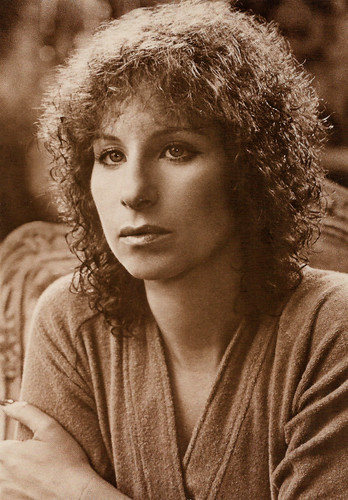
American postcard by Ludlow Sales, New York, N.Y., no. FC 60.

East German postcard by Progress Film-Verleih, Berlin, no. 500/12/89.
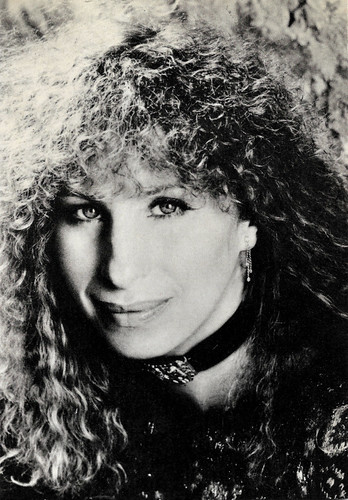
French postcard by Humour a la Carte, Paris, no. 3711.

German autograph card by Bravo.

French postcard by Lost Films Distribution. Promotion card for the 2018 re-issue of Yentl (Barbra Streisand, 1983).
Sources: Wikipedia (Dutch, German and French) and IMDb.
No comments:
Post a Comment